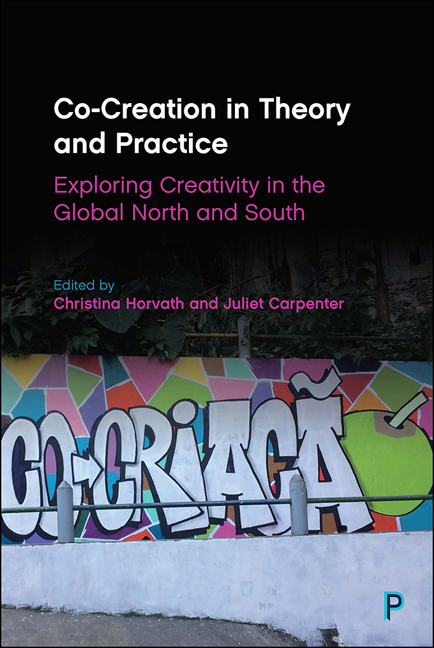17 - Capturing the Impact of Co-Creation: Poetry and Street art in Iztapalapa
Published online by Cambridge University Press: 18 March 2021
Summary
Introduction
Various chapters of this book have argued that Co-Creation, as an arts-based knowledge practice, helps improve participants’ skills, wellbeing, social capital, self-esteem and resilience, and that it strengthens community cohesion while also addressing stigmatisation attached to disadvantaged urban areas. This chapter proposes a reflection on whether and how these benefits can be measured.
Evidencing knowledge and transformative change resulting from Co-Creative projects can be challenging for a number of reasons. Artsbased projects tend to produce outcomes which are either intangible (such as shared knowledge, experience or understanding) or creative (such as collective paintings or literary works). While the first type of outcome can be assessed by measuring their transformative impact on behaviour, the second type can only be evaluated using aesthetic criteria which may not be able to take into account the experience produced through the creative process. Moreover, measuring transformative change resulting from Co-Creation projects currently constitutes an under-researched area. Scholarly research has so far mainly focused on impacts emerging from urban regeneration projects (Evans, 2005; Matarasso, 2009) or educational projects (Anderson, 2009; Forrest-Bank et al, 2016; Michels and Steyaert, 2017) Recent research in these areas has drawn attention to the tensions between short-term quantitative approaches and longer-term qualitative approaches (Matarasso, 2009) and has identified indicators likely to demonstrate social transformation, such as a decrease in criminal or antisocial behaviour, a positive shift in reputation attached to a place or group of people or increase in volunteering, public– private-voluntary sector partnerships, educational attainment, individual confidence and aspiration (Evans, 2005: 14– 15). Besides, the quasi-experimental design has proven successful in evidencing arts projects’ positive effect not only on individuals (Forrest-Bank et al, 2016) but also on families, larger groups (Michels and Steyaert, 2017), neighbourhoods and even entire cities (Anderson, 2009).
In line with these findings, this chapter seeks to test the efficiency of a quasi-experimental mixed-methods approach to evidence Co-Creation's impact and to advance our understanding of knowledge production processes within Co-Creation. Quasi-experimental designs generally require the manipulation of an independent variable using non-equivalent groups, pre-test, post-test, and interrupted time-series designs (Campbell and Stanley, 2015).
- Type
- Chapter
- Information
- Co-Creation in Theory and PracticeExploring Creativity in the Global North and South, pp. 271 - 290Publisher: Bristol University PressPrint publication year: 2020



